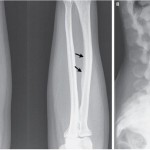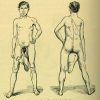Mark Twain once said, “Too much of anything is bad, but too much good whiskey is barely enough.” That may be true for whiskey, but apparently not for tea. A woman in Detroit, Michigan learned that lesson the hard way when she visited a doctor to determine the cause of the pain she’d been experiencing in her arms, legs, back and hips for five years — only to find out she’d done it to herself via a more than decade-long addiction to tea. For 17 years, the 47-year-old unnamed patient had made a daily ritual of drinking a large pitcher of tea made from 100 to 150 tea bags. Brewed tea, it turns out, has one of the highest levels of fluoride of any beverage available in the United States, and fluoride, it turns out, while good for your teeth in moderation, can damage your bones when ingested excessively. I think we can all agree this patient’s tea intake was “excessive.”
Continue reading →
What’s the difference between a medical assistant and a physician assistant? It sounds like a joke awaiting a punchline, but given their similar titles, there is some genuine confusion as to the difference between an MA and a PA. Both provide assistance to doctors — whether it be primary care physicians or specialists — but beyond that, how do the two jobs differ? Read on to find out.
Continue reading →
Some people have a lot of heart, others have a lot of brains; Carl Jones has a lot of kidneys. The 32-year-old Welshman from the small town of Carmarthen has four of the organ, in fact, and three pancreases to boot. The situation came about as the result of Jones’ type 1 diabetes, a disease in which the pancreas doesn’t produce enough insulin, resulting in high blood sugar levels. In 2004, he received not only a pancreas transplant, but he also had his kidneys replaced because the diabetes had caused them to fail.
The surgery went as planned, but within four years, his new organs had failed, and in 2008, doctors repeated the procedure. Rather than removing the old kidneys and pancreas, however, they left them inside Jones’ body. The reasoning was that the trauma of removing organs at the same time as adding new ones might be too much for the body to take. In order to minimize the chance of the transplanted organs failing again, surgeons just let the existing ones remain. “I may have four kidneys and three pancreases,” Jones stated in an interview, “but the organ donors have all the heart.” Continue reading →
Chances are at some point during your school years, your teacher told you to spit out your bubble gum because it’s noisy, rude or because constructing Hubba Bubba stalactites on the underside of your desk was just plain gross. But could it be that chewing gum could’ve actually helped you in school? A 2002 study conducted at the University of Northumbria in England suggested that, perhaps due to increased flow of oxygen to the brain, chewing gum while taking tests increases both long and short-term memory — specifically when it comes to remembering words and spatial orientation.
A 2011 follow-up study conducted at St. Lawrence University in New York suggested that chewing gum (which increases blood flow to the brain) improves your memory for only a 15 to 20-minute window — and only after chewing ceases. Participants who chewed gum for five minutes and then spat it out immediately before a test achieved higher scores that both those who didn’t chew at all and those who chewed gum throughout the test. Contradicting the 2002 study, those who kept chewing throughout the test fared no better than those who didn’t chew anything, a result that researchers attributed to the brain being distracted by the chewing motion. Continue reading →
In 2012, St. Louis resident Deloris Brown, 46, lost over 70 pounds through a strict regimen of diet and exercise. A few years earlier, in 2009, Portlander Andrew Aasen, 28, lost a whopping 140-plus pounds with a similar approach. What do these two have in common other than a truckload of sit-ups and sensible salads? They’re both medical assistants. Coincidence? Perhaps, but when you think about the exposure MAs have to healthy advice doled out to patients by doctors and even by the medical assistants themselves, it’s bound to have a positive impact on their own daily habits.
As the San Francisco Chronicle recently reported, doctors are increasingly focused on exercise as risk prevention, and medical assistants in their offices may be tasked with questioning patients about their exercise routines and adding those details to their charts, alongside traditional vitals like blood pressure, pulse and temperature. Meanwhile, MAs who work in specialist locations like weight management clinics may have more involved duties, including working directly with individuals struggling with their weight in order to help them lose the pounds and achieve their health goals. Continue reading →













